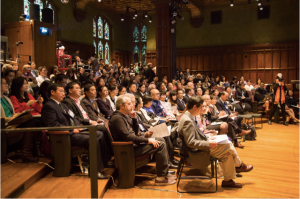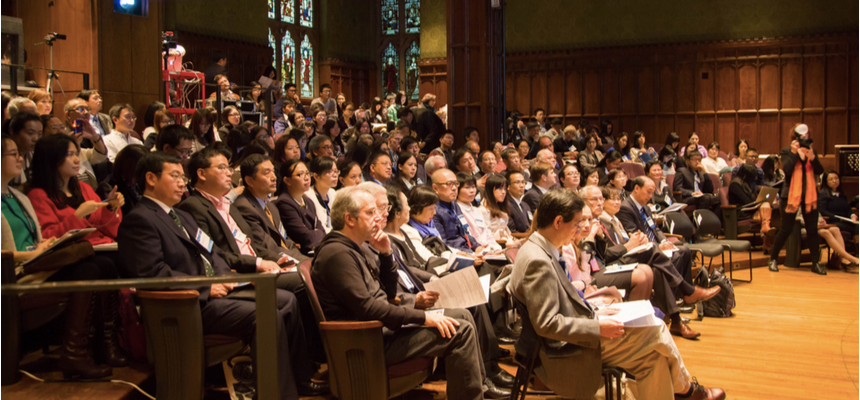BY JI LIU
Exactly 100 years ago, Dr. Kuo Ping Wen became the first Chinese doctoral degree recipient at Teachers College. Soon after his graduation from TC, he returned to China, and founded the National Southeast University in Nanking. Dr. Kuo was regarded as the father of modern Chinese higher education because of the many fundamental changes he brought with him. Under Dr. Kuo’s administration, National Southeast University developed into a modern university of many “firsts.” It was the first university in China to establish board-oversight in institutional management, to integrate teacher-education in a university-setting, to increase institutional visibility by engaging social services, and to open enrollment to both males and females. In 1926, Dr. Kuo also went on to found the China Institute. Dr. Kuo’s tireless work to advance China’s higher education system and to build Sino-U.S. relations has had a profound impact on China and the world, which still inspires many today.
On October 25th, 2014, co-organized by TC, the China Institute, the C.V. Starr East Asian Library of Columbia University, and co-sponsored by Ms. Carolyn Hsu-Balcer (Dr. Kuo’s great grandniece), and Mr. Kaiyuan Wang, Dr. Kuo’s legacy was celebrated at the Kuo Ping Wen Symposium, In Service to Education: The Life and Times of Kuo Ping Wen, China’s First Global Educator. The day-long event featured distinguished speakers including former Chinese Vice-Minister of Education Dr. Yu Wei, Teachers College President Susan Furhman, Southeast University Vice-President Bo Liu, and Teachers College William H. Kilpatrick Professor Henry Levin. Three panels of scholars from Mainland China, Hong Kong, and Taiwan also convened to discuss the history, philosophy, and present implications of Dr. Kuo’s legacy. Many high-level Chinese government officials, scholars, and faculty and students at Teachers College were also in attendance. In conjunction with the centennial celebrations, a book titled Kuo Ping Wen: Scholar, Statesman, and Reformer, co-edited by Ryan Allen and Ji Liu, was compiled to narrate the remarkable life achievements of Dr. Kuo.

As highlighted by President Susan Furhman, TC was the “birthplace of comparative and international education.” TC’s unyielding goal in educating scholars and leaders had tremendous impact on the development of education in China. Over the years, many instrumental figures in Chinese education had studied at TC, such as Tao Xingzhi, Hu Shih, Zhang Boling, Chen Heqin, Jiang Menglin, and certainly Kuo Ping Wen. In honor of Dr. Kuo’s legacy, along with the generous support from Carolyn’s family foundation, the Kuo Ping Wen Scholarship was established to support Chinese students who are pursuing graduate studies at TC, a trail blazed by Dr. Kuo over a century ago.
China is a country experiencing unprecedented growth and immense changes in every field, including education. As China Institute Vice-President Thomas Moore pointed out during his closing remarks at the Symposium on Saturday, “With increasing interconnectivity between the U.S. and China, the need for mutual understanding and cooperation is more important than ever.” The significance of this symposium was not only a celebration of Dr. Kuo’s achievements in education, but also a symbol and reflection of his enduring vision for the strengthening of Sino-U.S. relations. The privilege of peace and development that the new generation in these two nations enjoy today calls for a greater sense of joint responsibility and mutual interest. Dr. Kuo’s wisdom and insight are still an important and relevant message today, and in his own words, “let us hope that these ties of friendship will be preserved and I’m proved upon as the years go by, to the end that these two nations may continue to live in a happy state of friendship.”
